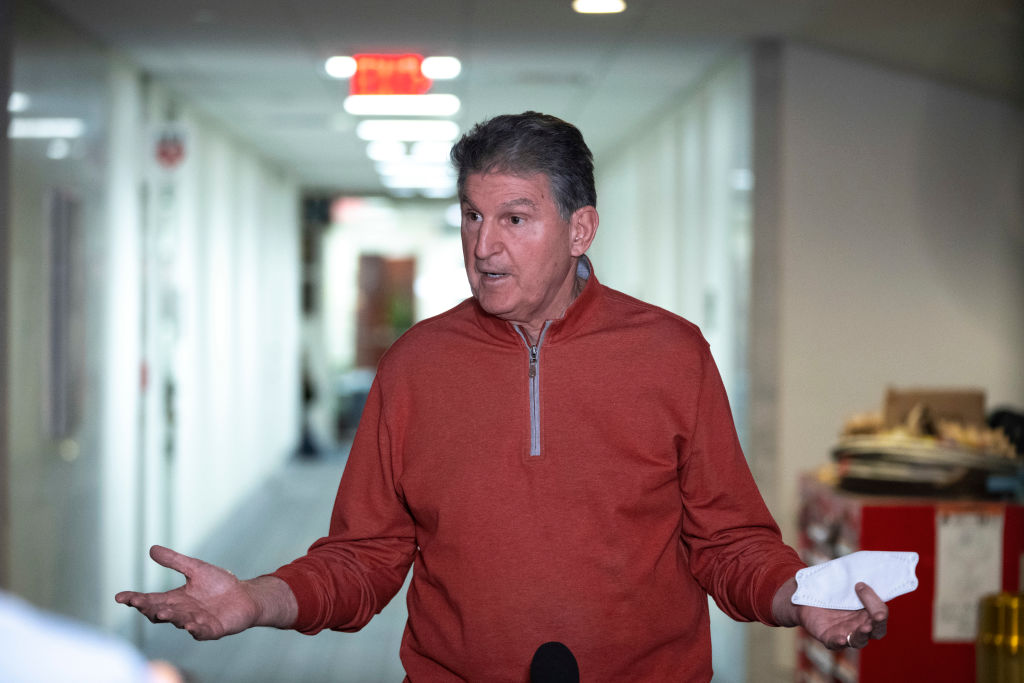At this point, why is the White House even bothering to unveil proposals without asking West Virginia Sen. Joe Manchin whether or not he’ll support them?
On Monday, President Joe Biden’s administration again unveiled another ambitious progressive budgetary push. This time, it was the “Billionaire Minimum Tax” — a minimum tax of 20 percent on all income households worth more than $100 million would have to pay, according to the Financial Times.
The proposal included a tax on unrealized capital gains — essentially taxing investments before they’re sold.
(At The Western Journal, we’ve long noted how destructive an unrealized capital gains tax would be on the American economy, costing us both gross domestic product and jobs. We’ll continue to bring readers the ugly truth about what the progressive agenda will mean for our country. You can help us by subscribing.)
The Billionaire Minimum Tax was supposed to provide $360 billion in revenue to offset a supersized $5.8 trillion spendthrift budget.
“One-hundredth of 1 percent of the Americans will pay this tax,” Biden said during remarks at the White House on Monday, according to a transcript.
“The Billionaire Minimum Tax is fair, and it raises $360 billion that can be used to lower costs for families and cut the deficit,” he said.
Unlike other progressive thrusts that have been shot down of late, the Billionaire Minimum Tax was something the administration could feasibly accomplish because, unlike regular legislative items, budgetary matters aren’t necessarily subject to the filibuster. Under reconciliation rules, all the Democrats need is 50 out of 100 votes — which is, coincidentally, is what the Democrats have. Since the vice president breaks all ties, if they could get their entire caucus on board with this, it was as good as law.
That’s a big if, however — and one that got shot down just one day after the White House unveiled the budget when Manchin, one of two Democrat swing votes in the upper chamber, announced he wouldn’t be supporting it.
“You can’t tax something that’s not earned. Earned income is what we’re based on,” Manchin told The Hill. “There’s other ways to do it. Everybody has to pay their fair share.”
“Everybody has to pay their fair share, that’s for sure,” he added. “But unrealized gains is not the way to do it, as far as I’m concerned.”
If Manchin sticks to his guns on this — and there’s no reason to believe he won’t, since that’s what he’s done on every other issue the White House and Senate Democrats have tried to bully him into caving on — the White House would have to peel off a Republican vote to get the Billionaire Minimum Tax passed along with the rest of the budget.
Since you have a better chance of finding Jimmy Hoffa alive and, at the age of 109, managing a Jack-in-the-Box in Fresno, California, we can safely declare this one deader than the former Teamsters boss.
The tax can be restructured without the unrealized gains tax left in, although it would generate considerably less revenue. However, as for why it’s best left out, Republican Sen. John Thune of North Dakota provided a succinct primer for you.
“The problem with that particular tax is that it’s a tax on unrealized gains,” said Thune, a member of the Senate Finance Committee.
“It’s essentially taxing people before they actually get the income, and that seems like a really dangerous precedent in tax law because if you have a gain one year and then a huge loss the next year, how’s the government going to pay people back for their losses?”
They’re not, and Sen. Elizabeth Warren won’t lose a wink of sleep over it. She’d have kept on blaming billionaires for not providing sinecures for each and every American when the Billionaire Minimum Tax ended up killing jobs and deep-sixing the economy.
Going back to the Manchin question, though: Why in the name of Biden isn’t the White House checking with him and the Senate’s other swing Democrat vote, Arizona’s Kyrsten Sinema, before it commits to a legislative push that’s dead on arrival?
Fine, there were months and months of negotiations between Manchin and the White House on the Build Back Better spend-o-palooza before the West Virginia senator announced he wasn’t going to support it. It still might have been a good idea to have him in the loop from the beginning, especially since so many of the environmental agenda items weren’t going to be supported by his constituents.
Then there was the Democrats’ federal voting package in January. Just days after Biden announced he wanted to invoke the nuclear option and do away with the filibuster to pass it — expending no small amount of political capital in the process — Manchin and Sinema announced they weren’t coming along for the ride. Whoops.
Now, we have a major White House initiative that barely survived 24 hours before Manchin pulled the plug.
At this point, the Biden administration should just invite him to every major public policy announcement it makes.
After the president finishes each bullet point, the media can pivot to the West Virginia senator, who will twist the thumb on his outstretched arm up or down like a Roman emperor sealing the fate of a gladiator. That’s basically what it’s come to.
Perhaps the White House thinks it’s putting pressure on Manchin to fall into line with the rest of the party. If he doesn’t, I suppose the theory goes, he’ll get primaried by a more progressive opponent … who’d promptly lose to whoever the Republicans put up in West Virginia.
As strategies go, almost anything could be better thought-out. Just like the “Billionaire Minimum Tax.”
This article appeared originally on The Western Journal.
























